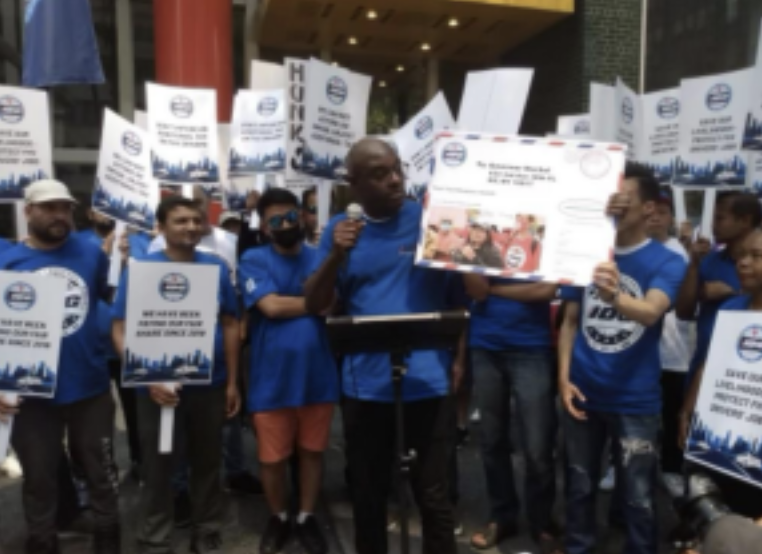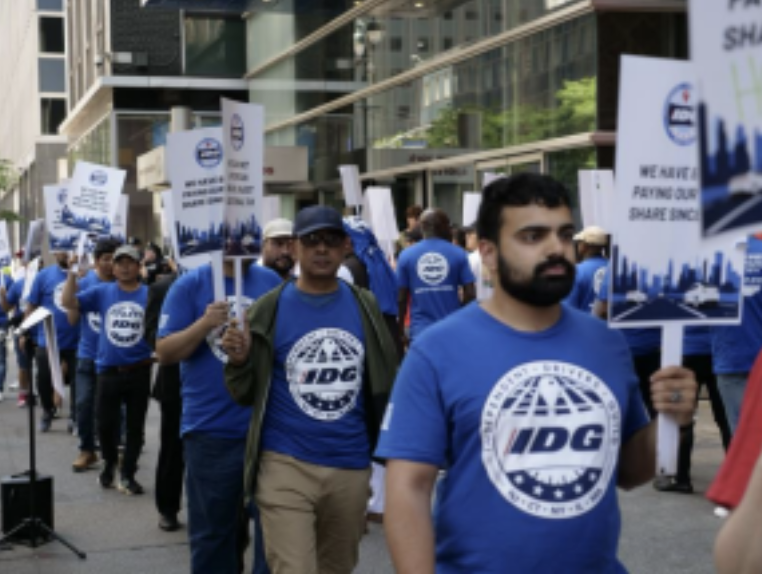The Central Business District (“CBD”) Tolling Program is probably the most controversial proposal for reducing traffic and raising funds for public transportation in New York City. The variable tolling program would charge vehicles that enter or remain in the Manhattan CBD, which is the area south of 60th Street (excluding the FDR Drive, which runs along the East River, and the West Side Highway). The revenue will be used to fund $15 billion worth of improvements to the subway, bus, and commuter rail systems in the Metropolitan Transportation Authority (“MTA”) Capital Plans.
The CBD Tolling Program requires federal approval and environmental review before it can be implemented. This is a lengthy process that is nearing the end. On June 26, 2023, the Federal Highway Administration (“FHWA”) gave its final approval of the CBD Tolling Program, issuing a final Finding of No Significant Impact (“FONSI”).1 This comes over a month after FHWA approved the release of the Final Environmental Assessment (“EA”).2 The FHWA now must make its final decision on the program. If approved, tolling could begin 310 days later, after the design, construction, testing, and activation of the tolling equipment. In that time, the toll amount and structure will also be determined and approved by the MTA.
As a result of the input received during the formal public comment period during the summer of 2022, the MTA made some changes to the final EA. Notably, the MTA now promises that taxis and for-hire vehicles (“FHVs”) will be charged no more than once per day—i.e., the same frequency that regular passenger vehicles will be tolled. This new mitigation measure was added to address concerns that the measures proposed in the draft EA effecting potential job insecurity—which included retraining taxi and FHV drivers to drive MTA buses—would be insufficient to address the disproportionate harm that congestion pricing will have on these drivers
if tolls were assessed more than once a day.
The toll rates have not been set yet, but the MTA is considering different scenarios that would charge $5 to $23 depending on the time of day. The biggest criticism of making taxis and FHVs pay even $5 a day is that congestion pricing will be in addition to the congestion surcharge that the MTA has been collecting from riders since 2019. These riders have paid the MTA more than $1 billion in taxes on trips south of 96th Street in Manhattan ($2.50 for taxis, $2.75 for FHVs, and $0.75 per pooled ride passenger). The current surcharge is paid by passengers (not drivers), and it applies to taxis, black cars, limos, liveries, and Uber and Lyft vehicles. When combined with the $0.50 MTA taxi surcharge in place since 2009, the MTA has collected nearly $2 billion
from taxi and FHV passengers. Congestion pricing and the congestion surcharge were born out of a single plan to reduce traffic congestion and raise funds for transportation and transit projects in New York City. Revealed in 2018, the “Fix NYC” plan had three phases.3 Phase 2 was to impose a congestion
surcharge on taxi and FHV trips. Phase 3 is implementing a variable tolling program to charge all vehicles to drive in the CBD. There is a question about whether the original plan intended for taxis and FHVs to pay the congestion pricing toll when they have a passenger who is already paying the congestion surcharge.
Tolling taxi and FHV vehicles once a day raises several questions about logistics. The biggest question is who will be responsible for paying the toll? State law requires the congestion surcharge fee be passed on to the passenger taking the trip. However, it seems unfair to put the onus of paying the toll onto the unlucky passenger who happens to be in the vehicle the first time it passes into the CDB tolling zone. Such a scenario could result in some passengers (at least attempting) to shop around for a taxi or Uber/Lyft driver that has already paid the toll for the day. However, at this point, it does not look like the MTA will make passengers directly responsible for paying the toll. f
The drivers at this point appear to be on the hook for paying the toll, which could lead to some drivers refusing service into Manhattan. Obviously, taxis are not supposed to refuse service on that basis, and Uber and Lyft and other FHV drivers could face repercussions for cancelling trips. Drivers would have to decide whether to enter Manhattan on their own – the same decision they have to make now if they want to cross a toll bridge when they are not transporting a passenger.
On June 2, 2023, FHV drivers protested against congestion pricing in front of Gov. Kathy Hochul’s New York City office to urge the governor and the MTA to exempt them from what they view as a double tax on them.4 The protest was arranged by the Independent Drivers Guild (“IDG”), which also sent a letter to the governor and other officials imploring them to put the congestion toll on passengers, not FHV drivers, to reduce congestion.5


Images above from IDG protest against Congestion Pricing.
Opposition to Congestion Pricing
Supporters of congestion pricing argue that it would discourage unnecessary driving, improve air quality, and generate revenue for the MTA. However, there are also politicians on both sides of the aisle – and on both sides of the Hudson – who are fighting to stop congestion pricing.
Representatives Nicole Malliotakis (R-Staten Island/South Brooklyn) and Josh Gottheimer (D-NJ) formed the “Anti-Congestion Tax Caucus” to push for additional study of the controversial
program in hopes of slowing or stopping implementation.6 Representatives Mike Lawler (R-NY) and Tom Kean Jr. (R-NJ) joined the group, which is using federal legislation, congressional oversight, and the threat of lawsuits to try to stop congestion pricing.7
So far, the bipartisan group of legislators introduced the Make Transportation Authorities Accountable and Transparent Act (H.R.159), which would require the Office of the Inspector General to conduct a full audit of the MTA to see how it spent billions in federal assistance, and the Economic Impact of Tolling Act (H.R.1759), which would prohibit the U.S. Department of Transportation (“DOT”) from congestion pricing program for any toll road, bridge, or tunnel until an economic impact analysis is completed and made available to the public.
Gottheimer and Lawler previously introduced the Anti-Congestion Tax Act (H.R.422), which would prohibit the U.S. DOT from awarding any new capital investment grants to MTA projects in New York until drivers from all New Jersey and New York crossings into Manhattan receive exemptions from any congestion pricing fees. This bill would also amend the U.S. tax code to offer commuters a federal tax credit at the end of the year equal to the amount they paid in congestion pricing fees.
New Jersey Governor Phil Murphy is apparently working with the Anti-Congestion Tax Caucus “to halt implementation of this misguided tolling plan,” and said that he is “closely assessing all legal options.”8 Murphy sent a 15-page letter to the FHWA urging the agency to require a more stringent Environmental Impact Statement (“EIS”).9 Murphy believes the Final EA failed to take into account the significant impact that the Tolling Program will have on the finances of New Jersey transportation agencies and Garden State commuters. He is also critical that the MTA’s plan “fails to guarantee New Jersey commuters full credit for tolls paid to cross bridges and tunnels into New York City, contemplates unreasonable tolls on commuter buses, and does not adequately address increased traffic and pollution that the proposal would cause in New Jersey communities.”10
Even though the FHWA issued a final FONSI allowing congestion pricing to move forward, not charging New Jersey drivers who already pay a toll to take the Holland and Lincoln Tunnels is still a possibility. On June 9, 2023, MTA CEO Janno Lieber told CBS New York that the MTA is taking “fairness to New Jersey into consideration.” but he added that “we’re not going to advantage New Jersey over New Yorkers.”11 Lieber went on to chide New Jersey, saying “with all due respect, they don’t ask our permission to increase tolls on the Garden State Parkway or the Jersey Turnpike,” and “we are very much entitled to deal with our Central Business District’s
existential congestion problem.” Nothing is certain yet, and, although Lieber’s comments were hardly a commitment to help New Jersey except to be “fair.”
The CBD Tolling Program was required to undergo an environmental review as a condition to its application to FHWA for the Value Pricing Pilot Program, which gives transportation agencies the option to manage traffic congestion through road tolling. As part of this process, FHWA is required to consider how the program would result in disproportionately high and adverse effects on minority and/or low-income populations (referred to as environmental justice, or “EJ” populations).
Issuing a FONSI means that the FHWA has determined that, with the mitigation measures in place, the CBD Tolling Program will have no significant impact on the human or natural environment, including EJ populations. An agency’s decision not to prepare an EIS carries considerable risk because it may be challenged in court. If the court decides that an EIS must be prepared, then the agency will have expended considerable time and resources on the litigation only to find that it is required to prepare an EIS.
What’s Next
Now that the FHWA issued a final decision, the MTA can proceed with the Congestion Pricing Project. Tolling could start as soon as 310 days after that happens, and the MTA is planning to launch congestion pricing by the second quarter of 2024. The earliest estimates are April 2024.12
Before congestion pricing can actually start, there is still work to be done. A six-member Traffic Mobility Review Board will recommend the fees, exemptions, and credits for tolls to the MTA. The MTA will hold at least one public hearing on the proposed tolling structure before making its determination. While the toll amounts are being worked out, the contractor has to install necessary infrastructure and E-ZPass readers.
Congestion pricing is a bold and innovative initiative that aims to reduce traffic congestion, improve air quality, and fund public transit in the city. The program has faced some challenges and criticisms—including equity concerns and implementation delays—and will undoubtedly face legal challenges that could delay implementation.
It is not a question of “if” congestion pricing is coming to New York, it is simply a question of “when and how much.” The program is seen as a model for other cities that are struggling with similar issues of urban mobility and sustainability. Once it is established here, we will likely see other cities implement their own congestion pricing schemes.
Matthew W. Daus, Esq.
President, International Association of Transportation Regulators http://iatr.global/
Transportation Technology Chair, City University of New York, Transportation Research Center at The City College of New York http://www.utrc2.org/
Partner and Chairman, Windels Marx Transportation Practice Group http://windelsmarx.com
Contact: mdaus@windelsmarx.com
156 West 56th Street | New York, NY 10019
T. 212.237.1106 | F. 212.262.1215
1 https://www.nytimes.com/2023/06/26/nyregion/nyc-congestion-pricing.html
2 https://new.mta.info/project/CBDTP/environmental-assessment 3 https://www.komanoff.net/cars_II/Fix-NYC-Panel-Report.pdf
3 https://www.komanoff.net/cars_II/Fix-NYC-Panel-Report.pdf
4 https://driversguild.org/for-hire-drivers-rally-against-congestion-pricing-tax/
5 https://driversguild.org/idg-letter-to-gov-hochul-double-congestion-tax-on-fhvs-is-unfair-illegal/
6 https://malliotakis.house.gov/media/in-the-news/ny-nj-lawmakers-join-forces-oppose-nyc-congestion-pricing-plan 7 https://abc7ny.com/congestion-pricing-mta-nyc-commuting/12956952/
8 https://www.nj.gov/governor/news/news/562023/20230505a.shtml
9
https://d31hzlhk6di2h5.cloudfront.net/20230613/9f/0d/9e/35/42c0d06d59250228e254a451/New_Jersey_Comments _on_CBDTP_Draft_FONSI_and_Final_EA_2023.06.12.pdf
10 https://www.nj.gov/governor/news/news/562023/20230613a.shtml
11 https://www.cbsnews.com/newyork/news/congestion-pricing-double-taxation-new-york-new-jersey/
12 https://www.bloomberg.com/news/articles/2023-05-12/nyc-congestion-pricing-is-coming-to-manhattan-as-soon as-april-2024.






